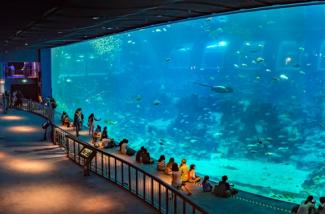
Singapore, 28 November 2018 (Wednesday) – The Institute of Service Excellence (ISE) (卓越服务研究院)at Singapore Management University (SMU) today released the 2018 third quarter (Q3) Customer Satisfaction Index of Singapore (CSISG) results for the Food & Beverage (F&B) and Tourism sectors.
Both sectors registered statistically significant improvements in customer satisfaction compared to a year ago. The F&B sector climbed 3.5% year-on-year to score 74.2 points on a 0 to 100 scale. The Tourism sector recorded a relatively more modest 1.2% year-on-year improvement to score 75.1 points.
In both instances, these performances represented a fourth consecutive year of increase in customer satisfaction scores and the highest recorded scores in the 12-year history of the national CSISG study.
Food & Beverage Sector
The F&B sector comprises of four sub-sectors: Cafes & Coffee Houses, Fast Food Restaurants, Restaurants, and Snack Bars & Food Kiosks.
While each of these four sub-sectors notched higher scores year-on-year, measurable improvements were recorded for the Fast Food Restaurants and Restaurants sub-sector. Fast Food Restaurants scored 73.6 points, a 2.7% improvement, while Restaurants scored 74.4 points, a 4.0% improvement.
With the increased adoption of Self-order Kiosks at several fast food chains, a notable observation in the Fast Food restaurants sub-sector is: Customers that used these kiosks as their most frequent method to place their orders were found to have similar levels of customer satisfaction when compared to customers who most frequently place their orders via the traditional way, i.e., with a counter service staff.
In addition, the group of customers that frequent kiosks ordering rated a key metric ‘Ordering process is simple’ appreciably higher than customers ordering via the counter service staff.
“Further analysis showed that a simple ordering process was a significant driver of customers’ perceptions of quality at fast food restaurants,” said Mr Chen Yongchang (陈勇畅), Head of Research and Consulting at ISE.
“The industry’s increased adoption of Self-order Kiosks appear to help simplify ordering processes and, if done well, will positively drive fast food customers’ dining experience over time,” suggested Mr Chen.
Tourism Sector
The Tourism sector comprises of the Attractions and the Hotels sub-sectors. Year-on-year, Attractions saw a measurable 1.1% improvement in customer satisfaction, scoring 74.1 points, while the Hotels sub-sector’s performance, at 75.3 points, remained statistically unchanged.
The Attractions sub-sector’s improved customer satisfaction levels came on the back of stronger year-on-year performances in 10 of the 13 measured quality drivers. These drivers include attributes such as the venue’s cleanliness, helpfulness of staff, and waiting times.
Additional analysis of the sub-sector also compared satisfaction levels of visitors that searched for information about the attraction prior to their visit against visitors who did not seek out any information: Visitors that searched for information were markedly more satisfied than those that did not. In fact, these visitors that did prior research also had notably higher scores in several other metrics recorded in the study, including predicted quality, perceived quality, perceived value, and loyalty.
“Getting information about an attraction prior to a visit helps the consumer curate the visit to suit his or her own needs,” remarked Ms Neeta Lachmandas (妮塔.拉切曼达斯), Executive Director (执行总监) of ISE.
“Attraction operators should take the opportunity to help information-seeking customers to shape and frame their expectations beforehand, setting the stage for these guests to experience the park or museum in the best possible way,” she concluded.
The CSISG 2018 Q3 study was conducted between July and October 2018. A total of 6,900 respondents, comprising 3,060 locals and 3,840 tourists, were surveyed.
Please refer to Annex A for a background on the CSISG and Annex B for the detailed scores.
********
For media queries, please contact:
Mr Tim Zhuang
Senior Manager, Partnerships and Programme Development
Institute of Service Excellence (ISE) at Singapore Management University
DID: (65) 6808 5258
Mobile: (65) 9748 9389
Email: timzhuang [at] smu.edu.sg (timzhuang[at]smu[dot]edu[dot]sg)
Mr Teo Chang Ching
Senior Assistant Director, Corporate Communications
Office of Corporate Communications and Marketing
DID: (65) 6828 0451
Mobile: (65) 9431 8353
Email: ccteo [at] smu.edu.sg (ccteo[at]smu[dot]edu[dot]sg)